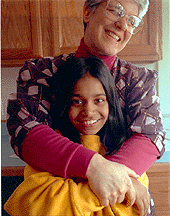
The University of Chicago Magazine
February 1997

Family Practice

Mother Teresa, the famous nun, met Jerri Jenista, MD'77, the not-so-famous pediatrician, in 1995 in a Calcutta orphanage. Nearby, Jenista's four adopted Indian daughters were beaming.
Greeting the family, the nun re-marked, Why not take four more?
The request was not so far-fetched. Not only is Jenista happily raising four girls, ages 10 to 13, but she also recently adopted a 2-year-old Indian boy, Subhendu. And she is a single mom.
Yet when one visits Jenista at her home in Ann Arbor, MI, there is no halo--unless it's hidden in her short, gray hair. There is no tale of spiritual odyssey, unless it's concealed in the dozens of books about India that fill her bookshelves. There is no cosmic plan to save the world from poverty, no plea for others to do the same.
No, there is just Jerri Jenista--looking efficient.
As she talks, Jenista is cutting Indian fabric to sew into clothes for a daughter. She works on a table that is a fixture from her childhood. In fact, she claims to have slept beneath this same table as a teenager, feeling lucky to have a space of her own away from eight siblings.
Jenista was born in Key West. As her father pursued his military career, her family lived "everywhere," she says, and she graduated from a girls' Catholic high school outside Washington, D.C.
As a teenager, Jenista recalls distinctly not wanting to raise children. About a decade later, however--after graduation from the Pritzker School of Medicine and while working in New York--she tried to adopt a child from Latin America. As a single person, she was turned down.
When a patient told her about an adoption program in India, Jenista applied. "Baby Jenista"--now Louisa, a 13-year-old middle-school student--soon arrived.
Jenista moved to Ann Arbor to take a job on the faculty of the University of Michigan Medical School, and applied to adopt another baby. When she learned red tape would delay the arrival, she passed the time by knitting 89 little sweaters--one for each day of waiting--that were later given to Annika, now 11.
Jenista's third daughter, 10-year-old Julia, came from the Indian orphanage operated by Mother Teresa. The family met the Nobel Prizewinning humanitarian during a four-month trip they took through Japan and India.
Rohina, 12, joined the family seven years ago. Then 5, she wailed inconsolably on the plane trip home with Jenista. Today, Rohina, who has cerebral palsy, uses a wheelchair and attends a special-needs school.
Jenista left her job at the University of Michigan several years ago because it consumed so much time, causing her to spend up to $28,000 a year on child care. She currently works two nights each weekend as an emergency-room physician at St. Joseph Mercy Hopital. "Now I can go five days without leaving the house," she says. "It's a lot less stress. I see my job as where I get my money."
With years of experience and pounds of printed information, Jenista enjoys helping other prospective parents through the maze of adoption. She writes a newsletter, speaks at conferences about adoption, and has offered hundreds of free hours of medical advice and moral support. "For anyone who truly wants to adopt," Jenista says, "there's a child out there."--Anne Valentine
Within Class News:
Go to:
- INVESTIGATIONS
- CHICAGO JOURNAL
- EVENTS
- LETTERS
- CHICAGOPHILE
- Feature story, "Life Support"
- Feature story, "Brushes with perfection"
- Feature story, "Opening Chapters"
- Feature story, "Astronomical Figures"